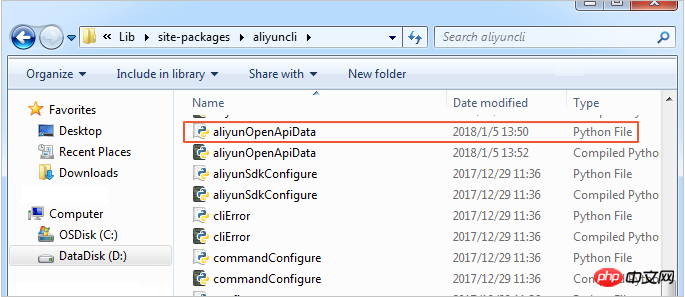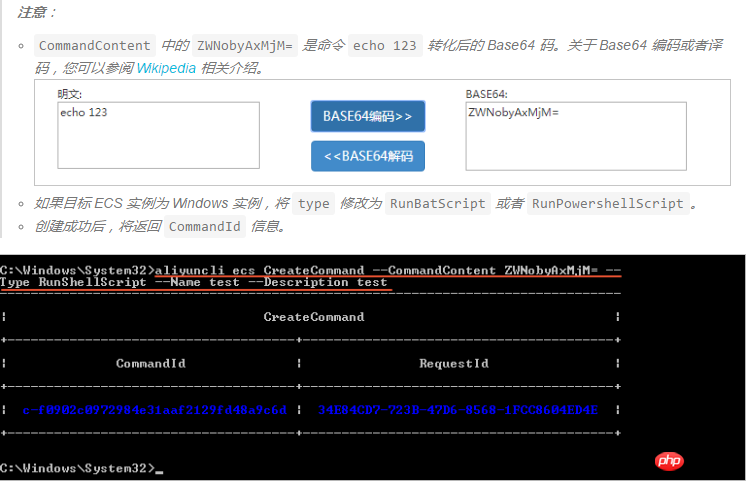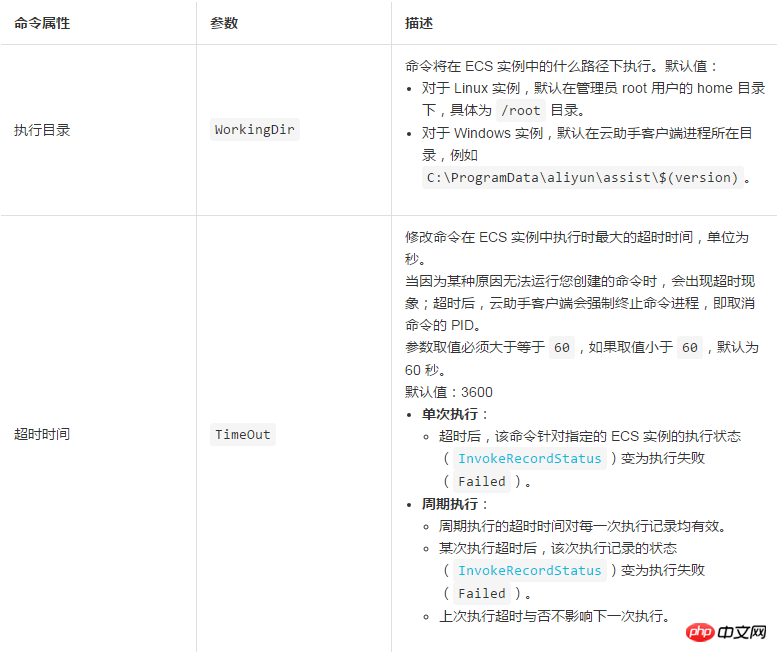 Operation and Maintenance
Operation and Maintenance
 Linux Operation and Maintenance
Linux Operation and Maintenance
 How to use Cloud Assistant to automate instance management
How to use Cloud Assistant to automate instance management
How to use Cloud Assistant to automate instance management
The content of this article is about how to use cloud assistant to automatically manage instances. It has certain reference value. Friends in need can refer to it. I hope it will be helpful to you.
Use Cloud Assistant to automatically manage instances
The purpose of operating and maintaining ECS instances is to maintain the best status of the ECS instances and ensure the efficiency of troubleshooting, but manual maintenance will cost you a lot of time and energy , therefore Alibaba Cloud developed a cloud assistant to solve how to automate and batch process daily maintenance tasks. This article gives an example of how to use the Cloud Assistant API to execute corresponding commands for ECS instances to achieve the purpose of automated operation and maintenance of ECS instances.
Command type introduction
Currently, Cloud Assistant supports the following three command types.

Prerequisites
You need to ensure that the network type of the target ECS instance is a private network (VPC ).
The status of the target ECS instance must be Running.
The target ECS instance must have the Cloud Assistant client pre-installed. You can refer to Alibaba Cloud Assistant to install and use the Cloud Assistant client.
When executing a command of type PowerShell, you need to ensure that the target Windows instance has the PowerShell module configured.
The following examples are completed in the command line tool. You need to ensure that you have installed the Alibaba Cloud command line tool CLI (Command-Line Interface).
For Windows examples, see Install command line tools and SDK online.
For Linux examples, see Install command line tools and SDK online.
You need to upgrade the SDK.
Modify CLI configuration:
Download the file aliyunOpenApiData.py.
Replace the file aliyunOpenApiData.py in the path %python_install_path%\Lib\site-packages\aliyuncli with the downloaded file.

For how to configure Alibaba Cloud CLI, please refer to the document Configuring Command Line Tools and SDK.
Operation steps
The following examples illustrate how to use Cloud Assistant through API in Alibaba Cloud CLI to execute corresponding commands for ECS instances. Take executing an echo 123 command as an example.
Run aliyuncli ecs CreateCommand --CommandContent ZWNobyAxMjM= --Type RunShellScript --Name test --Description test create command (CreateCommand) in CMD, PowerShell or Shell of the local computer.

Run aliyuncli ecs InvokeCommand --InstanceIds your-vm-instance-id1 instance-id2 --CommandId your-command-id --Timed false Execute the command (InvokeCommand).
Note:
InstanceIds is your ECS instance ID. Multiple ECS instances are supported, up to 100.
Timed indicates whether it is a periodic task, Timed True indicates it is a periodic task, and Timed False indicates it is not a periodic task.
When your task is a periodic task, that is, when the parameter Timed is True, you need to specify the period through the parameter Frequency. For example, 0 */20 * * * * means that the period is every 20 minutes. For more details about Cron expressions, please refer to Cron expression value description.
The return result is a common InvokeId for all target ECS instances. You can use the InvokeId to query the execution of the command.
(Optional) Run aliyuncli ecs DescribeInvocations --InstanceId your-vm-instance-id --InvokeId your-invoke-id to view the command execution status (DescribeInvocations). Among them, InvokeId is the execution ID returned when executing the command for the ECS instance in the second step.
When the return parameter InvokeStatus is Finished, it only means that the execution of the command process is completed. It does not mean that there must be the expected command effect. You need to check the actual specific execution results through the parameter Output in DescribeInvocationResults.
(Optional) Run aliyuncli ecs DescribeInvocationResults --InstanceId your-vm-instance-id --InvokeId your-invoke-id to view the actual execution results of the command of the specified ECS instance (DescribeInvocationResults). Among them, InvokeId is the execution ID returned when executing the command for the ECS instance in the second step.
When creating a command (CreateCommand), you can also set the following request parameters for the command.

Complete code example for using Cloud Assistant through Python SDK
You can also use Cloud Assistant through Alibaba Cloud SDK. For information on how to configure the Alibaba Cloud SDK, refer to the document Configuring Command Line Tools and SDK. Below is a complete code example for using Cloud Assistant via the Python SDK.
# coding=utf-8
# if the python sdk is not install using 'sudo pip install aliyun-python-sdk-ecs'
# if the python sdk is install using 'sudo pip install --upgrade aliyun-python-sdk-ecs'
# make sure the sdk version is 2.1.2, you can use command 'pip show aliyun-python-sdk-ecs' to check
import json
import logging
import os
import time
import datetime
import base64
from aliyunsdkcore import client
from aliyunsdkecs.request.v20140526.CreateCommandRequest import CreateCommandRequest
from aliyunsdkecs.request.v20140526.InvokeCommandRequest import InvokeCommandRequest
from aliyunsdkecs.request.v20140526.DescribeInvocationResultsRequest import DescribeInvocationResultsRequest
# configuration the log output formatter, if you want to save the output to file,
# append ",filename='ecs_invoke.log'" after datefmt.
logging.basicConfig(level=logging.INFO,
format='%(asctime)s %(filename)s[line:%(lineno)d] %(levelname)s %(message)s',
datefmt='%a, %d %b %Y %H:%M:%S',filename='aliyun_assist_openapi_test.log', filemode='w')
#access_key = 'Your Access Key Id'
#acess_key_secrect = 'Your Access Key Secrect'
#region_name = 'cn-shanghai'
#zone_id = 'cn-shanghai-b'
access_key = 'LTAIXXXXXXXXXXXX'
acess_key_secrect = '4dZXXXXXXXXXXXXXXXXXXXXXXXX'
region_name = 'cn-hangzhou'
zone_id = 'cn-hangzhou-f'
clt = client.AcsClient(access_key, acess_key_secrect, region_name)
def create_command(command_content, type, name, description):
request = CreateCommandRequest()
request.set_CommandContent(command_content)
request.set_Type(type)
request.set_Name(name)
request.set_Description(description)
response = _send_request(request)
if response is None:
return None
command_id = response.get('CommandId')
return command_id;
def invoke_command(instance_id, command_id, timed, cronat):
request = InvokeCommandRequest()
request.set_Timed(timed)
InstanceIds = [instance_id]
request.set_InstanceIds(InstanceIds)
request.set_CommandId(command_id)
request.set_Frequency(cronat)
response = _send_request(request)
invoke_id = response.get('InvokeId')
return invoke_id;
def get_task_output_by_id(instance_id, invoke_id):
logging.info("Check instance %s invoke_id is %s", instance_id, invoke_id)
request = DescribeInvocationResultsRequest()
request.set_InstanceId(instance_id)
request.set_InvokeId(invoke_id)
response = _send_request(request)
invoke_detail = None
output = None
if response is not None:
result_list = response.get('Invocation').get('InvocationResults').get('InvocationResult')
for item in result_list:
invoke_detail = item
output = base64.b64decode(item.get('Output'))
break;
return output;
def execute_command(instance_id):
command_str = 'yum check-update'
command_id = create_command(base64.b64encode(command_str), 'RunShellScript', 'test', 'test')
if(command_id is None):
logging.info('create command failed')
return
invoke_id = invoke_command(instance_id, command_id, 'false', '')
if(invoke_id is None):
logging.info('invoke command failed')
return
time.sleep(15)
output = get_task_output_by_id(instance_id, invoke_id)
if(output is None):
logging.info('get result failed')
return
logging.info("output: %s is \n", output)
# send open api request
def _send_request(request):
request.set_accept_format('json')
try:
response_str = clt.do_action(request)
logging.info(response_str)
response_detail = json.loads(response_str)
return response_detail
except Exception as e:
logging.error(e)
if __name__ == '__main__':
execute_command('i-bp17zhpbXXXXXXXXXXXXX')The above is the detailed content of How to use Cloud Assistant to automate instance management. For more information, please follow other related articles on the PHP Chinese website!

Hot AI Tools

Undresser.AI Undress
AI-powered app for creating realistic nude photos

AI Clothes Remover
Online AI tool for removing clothes from photos.

Undress AI Tool
Undress images for free

Clothoff.io
AI clothes remover

Video Face Swap
Swap faces in any video effortlessly with our completely free AI face swap tool!

Hot Article

Hot Tools

Notepad++7.3.1
Easy-to-use and free code editor

SublimeText3 Chinese version
Chinese version, very easy to use

Zend Studio 13.0.1
Powerful PHP integrated development environment

Dreamweaver CS6
Visual web development tools

SublimeText3 Mac version
God-level code editing software (SublimeText3)

Hot Topics
 1387
1387
 52
52
 How to use docker desktop
Apr 15, 2025 am 11:45 AM
How to use docker desktop
Apr 15, 2025 am 11:45 AM
How to use Docker Desktop? Docker Desktop is a tool for running Docker containers on local machines. The steps to use include: 1. Install Docker Desktop; 2. Start Docker Desktop; 3. Create Docker image (using Dockerfile); 4. Build Docker image (using docker build); 5. Run Docker container (using docker run).
 How to view the docker process
Apr 15, 2025 am 11:48 AM
How to view the docker process
Apr 15, 2025 am 11:48 AM
Docker process viewing method: 1. Docker CLI command: docker ps; 2. Systemd CLI command: systemctl status docker; 3. Docker Compose CLI command: docker-compose ps; 4. Process Explorer (Windows); 5. /proc directory (Linux).
 What to do if the docker image fails
Apr 15, 2025 am 11:21 AM
What to do if the docker image fails
Apr 15, 2025 am 11:21 AM
Troubleshooting steps for failed Docker image build: Check Dockerfile syntax and dependency version. Check if the build context contains the required source code and dependencies. View the build log for error details. Use the --target option to build a hierarchical phase to identify failure points. Make sure to use the latest version of Docker engine. Build the image with --t [image-name]:debug mode to debug the problem. Check disk space and make sure it is sufficient. Disable SELinux to prevent interference with the build process. Ask community platforms for help, provide Dockerfiles and build log descriptions for more specific suggestions.
 What computer configuration is required for vscode
Apr 15, 2025 pm 09:48 PM
What computer configuration is required for vscode
Apr 15, 2025 pm 09:48 PM
VS Code system requirements: Operating system: Windows 10 and above, macOS 10.12 and above, Linux distribution processor: minimum 1.6 GHz, recommended 2.0 GHz and above memory: minimum 512 MB, recommended 4 GB and above storage space: minimum 250 MB, recommended 1 GB and above other requirements: stable network connection, Xorg/Wayland (Linux)
 vscode cannot install extension
Apr 15, 2025 pm 07:18 PM
vscode cannot install extension
Apr 15, 2025 pm 07:18 PM
The reasons for the installation of VS Code extensions may be: network instability, insufficient permissions, system compatibility issues, VS Code version is too old, antivirus software or firewall interference. By checking network connections, permissions, log files, updating VS Code, disabling security software, and restarting VS Code or computers, you can gradually troubleshoot and resolve issues.
 Can vscode be used for mac
Apr 15, 2025 pm 07:36 PM
Can vscode be used for mac
Apr 15, 2025 pm 07:36 PM
VS Code is available on Mac. It has powerful extensions, Git integration, terminal and debugger, and also offers a wealth of setup options. However, for particularly large projects or highly professional development, VS Code may have performance or functional limitations.
 What is vscode What is vscode for?
Apr 15, 2025 pm 06:45 PM
What is vscode What is vscode for?
Apr 15, 2025 pm 06:45 PM
VS Code is the full name Visual Studio Code, which is a free and open source cross-platform code editor and development environment developed by Microsoft. It supports a wide range of programming languages and provides syntax highlighting, code automatic completion, code snippets and smart prompts to improve development efficiency. Through a rich extension ecosystem, users can add extensions to specific needs and languages, such as debuggers, code formatting tools, and Git integrations. VS Code also includes an intuitive debugger that helps quickly find and resolve bugs in your code.
 How to back up vscode settings and extensions
Apr 15, 2025 pm 05:18 PM
How to back up vscode settings and extensions
Apr 15, 2025 pm 05:18 PM
How to back up VS Code configurations and extensions? Manually backup the settings file: Copy the key JSON files (settings.json, keybindings.json, extensions.json) to a safe location. Take advantage of VS Code synchronization: enable synchronization with your GitHub account to automatically back up all relevant settings and extensions. Use third-party tools: Back up configurations with reliable tools and provide richer features such as version control and incremental backups.



